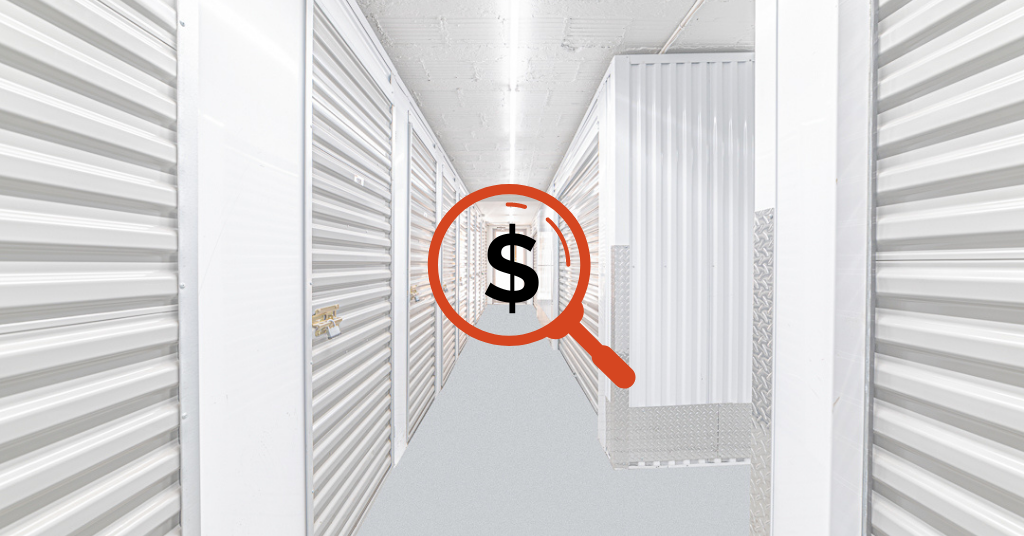
A common area of frustration among self-storage customers is storage unit pricing. We’ve heard stories of other self-storage facilities unexpectedly increasing rates, vagueness around offers, and confusion around administrative fees. Here, we break down what you should know about storage unit pricing before you rent.
Storage unit prices: cheaper isn’t always better
When you first begin your search for self-storage, your natural instinct may be to look for a self-storage facility near you with the lowest price. At first glance, you may believe you are getting a great price. However, before you click that reserve or rent button, know why some storage units may be less expensive.

One of the most common reasons a storage unit price is so low is because it is in a poor location or has an impediment, like a pillar. If there isn’t a facility map or photos of the unit online, it’s best to call the facility and ask before you rent. Also, pay attention to specific amenities and features, such as unit height and access. On the Honore Storage rates page, we include unit height.
Typically, the cheapest units don’t include amenities like shelving, electricity, or temperature control. If you need a feature that you don’t see online, check with the facility first. The last thing you want to do is get to a storage facility to find that the unit is only four feet high and accessible only by stairs.
If it is your first time renting a storage unit, call the facility. Speak to an experienced facility manager or customer support if you can’t find these details online.
Price increases
Price increases are tough but necessary due to rising facility maintenance costs, property taxes, and many other factors. Generally, under landlord-tenant laws, which vary by state, landlords are required to provide 30-days notice for rental increases if a tenant is renting month to month. Sometimes, facilities will offer an incredible deal and increase their rates within the first three months. Our policy has always been to keep rates the same for at least six months. Most of our tenants receive rent adjustments annually.

Some facilities may be willing to discuss a rate lock
If you’re concerned about price increases, ask the facility what their policy is before you rent a storage unit. Some facilities may be willing to discuss a rate lock. Ask if you can pre-pay for several months to lock in a rate. You also should offer to pay by credit card and sign up for autopay to encourage the facility to work with you.
If you are a customer and are notified of a price increase, make sure that you understand why. If the facility increases prices without demonstrating any value, it may be time to consider a new facility.
Storage unit promotions
As a way of enticing new customers to their facilities, many self-storage companies will run special promotions. Honore Storage does this. Promotions are a great way to save money! However, be sure you are clear on the terms.
Typical promotions you may come across in your search include:
- The first month free: Be sure to ask if it is 30 days from move-in date or move-in month, meaning if you move in on November 15, you will be billed on December 1
- Special pricing or percentage off: For how long? Is it only for specific unit types/sizes?
Also, ask if the promotion comes with any additional incentives like a free lock or moving truck rental.
Other pricing factors to consider
Before renting a self-storage unit, know what the costs are to save yourself money over the long-term. Additional costs to consider include:
- administrative fees
- necessary equipment
- personal time
- protection/safety of your belongings
Personal Costs
This is probably one of the most overlooked areas to consider when renting a self-storage unit. For example, the storage facility could be two miles from where you live, but there is no parking. Or the loading area is outdoors or not easily accessible. Ask yourself the following questions before you rent:
- Is the facility ideally located for me?
- How easy/difficult will it be for me to move my belongings in/out of my storage unit?
- Is the facility secure?
- Am I confident that my belongings will be safe here?
Insurance

While insurance is not required in Illinois, most self-storage facilities include a clause in their lease that states that they are not responsible if anything happens to tenant belongings. Similar to protecting your belongings in your home or apartment, you want to give yourself peace of mind when storing your belongings in self-storage.
To avoid the cost of having to pay for insurance, first see if your homeowner or renter’s insurance covers stored items. If not, you can obtain insurance on your own but come prepared with proof of insurance. If you do not have insurance, most storage facilities can help you sign up with a storage insurance provider. Ask what the insurance cost is before signing the contract.
Lock
Every storage unit is required to have a lock. Avoid an additional cost at the time you move in by purchasing in advance. Some facilities will include a free lock as part of their promotion.
Administrative Fees
Last but not least, the administrative fees. Administrative fees are a way for storage facilities to recoup some of the marketing and labor costs associated with new tenant sign ups. These fees vary by facility but are commonplace in the industry.
If you do not see administrative fees listed online, call the storage facility. Ask for their policy on administrative fees. This will help you calculate the full cost of your storage unit rental.
Renting a storage unit shouldn’t be an added stress to your move or project. If you know the right questions to ask, you’ll be well on your way to a seamless rental experience.

Recent Comments